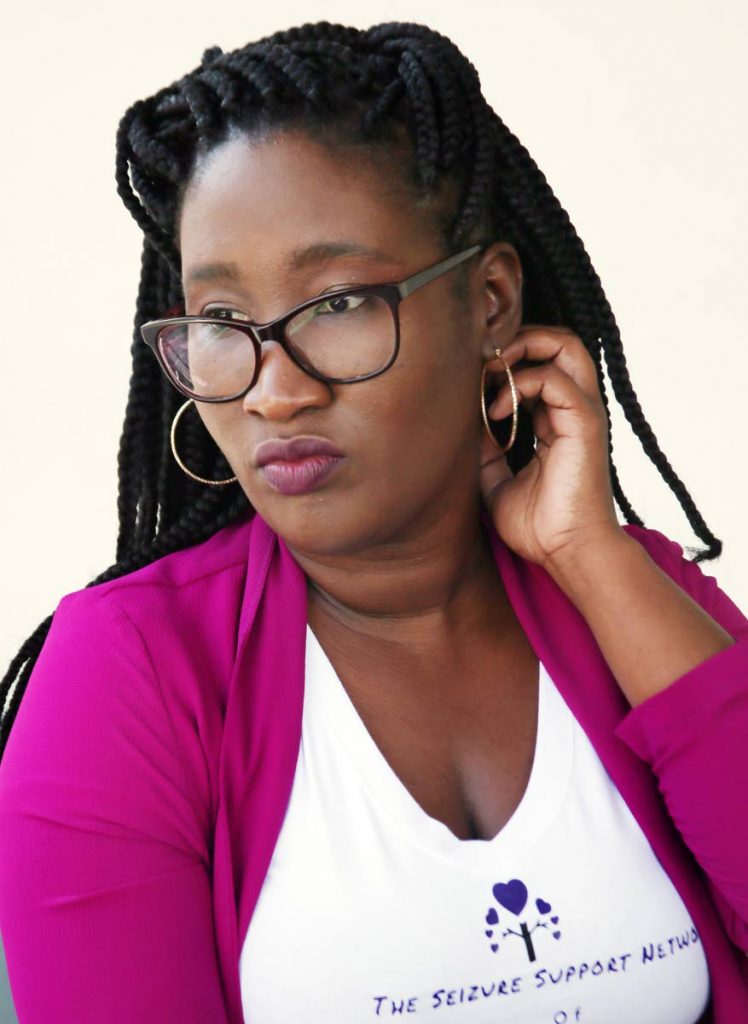Treating with seizures

JENSEN LA VENDE
THERE are approximately 40,000 people in the country who suffer from seizures, yet there has been no recognised body advocating for them, until now.
Seeing the need for a community, Dionne Baptiste founded the Seizure Support Network, which will host a seminar
tomorrow
at Bead Café, Mucurapo Road from 9.30 am to 12 pm. The seminar is entitled Each One Teach One.
Baptiste, who had her first seizure ten years ago, on March 20, while standing in line at a bank, hopes to bring some awareness to those suffering. The mother of one has a message for the country, firstly to those who suffer from seizures – you are not alone – and to others: seizure sufferers are not liabilities and can live “normal lives.”
Speaking with Newsday on Tuesday, Baptiste, a producer and journalist with the Caribbean New Media Group (CNMG), said there is a burden that those who suffer seizures have that the rest of the world may not know. Stifling tears, the 30-year-old recalled earlier this month she was told of a 19-year-old who committed suicide the day before her birthday. She overdosed on the medication prescribed to treat her illness, and left a note saying she could no longer live like that.
“You know, that could have been me, I was once at that point, where you feel like you have no hope,” Baptiste said adding that she used to have seizures of up to 45 times a day, with each episode lasting from 30 seconds to as much as three minutes.
Seizures, according to the Epilepsy Foundation is caused by a sudden surge of electrical activity in the brain. The brain cells send signals simultaneously telling the body to do and not do an action causing the body to either shut down or convulse for a period. Most victims recover unknown that they had just suffered a seizure. Baptiste said many times she had to be told that she had a seizure after waking up slightly disoriented or somewhere she wasn’t before. She complained about the cost of the medication and some of the side effects of the drugs prescribed which includes liver failure. In rare occasions the treatment may exacerbate the seizures.
The network, she said, is geared towards offering support to anyone who needs and wants it and a safe haven for those who suffer from seizures. She recalled being called demon-possessed and having preachers try to cast out demons from her. She gave horror stories of being robbed of $2,600, her entire month’s rent, during an episode, falling while pregnant with her now two-year-old daughter, waking up in a police station only to be told she had had a seizure and was brought there by a concerned and confused driver, and one time falling off a banister.
Her seizures had her kicked out of school, with less than one course worth of work to do to complete her BA in English with a minor in psychology.
It is her hope that the support network can rally for such atrocities not to recur. She is also optimistic that both the Ministry of Education and Health will embark on a nationwide education drive.
“When I was first diagnosed I didn’t know anyone who had seizures, and while my parents were there, I had no one to talk with who could understand what I was going through.
“It wasn’t until three years later that I met someone who had a relative that suffered with seizures. The person eventually died as a result of seizure-related complications,” Baptiste said, adding she was basically told to go home and wait to die by doctors.
She wants the world to know that while there are some limitations caused by having seizures, such as the inability to drive until you have had no seizures for two consecutive years, living with them is not a death sentence, nor should those who have them live in isolation.
She combines a mixture of traditional and herbal medicines which have had a positive effect on her and reduced her seizures to at most three times a day – on the days she does have a seizure.
There will be doctors at the seminar who use both traditional and a mixture of non-traditional and traditional medicine to answer questions for those in attendance, as well as a chance for some to meet members of their newly-formed community. Since the group was formed late last year, most of the financial contributions have been out of her pocket, she said, and from good Samaritans. Baptiste added that she is not looking for handouts but hoping that those who suffer will be recognised and afforded the proper treatment and not be shunned.
“There are other support groups for other people and I thought, why not us?”
Baptiste said her bullet points on living with seizures are: “I am not demon-possessed. I am not slow. Seizures are not contagious. You cannot swallow your tongue – and please do not put a spoon or anything in the mouth of the seizing person.
“I want people to stop seeing ‘seizure’ when they see me. We don’t want to lose anyone again like that young lady. Seizure first aid is very simple. Do not see us as liabilities.”


Comments
"Treating with seizures"